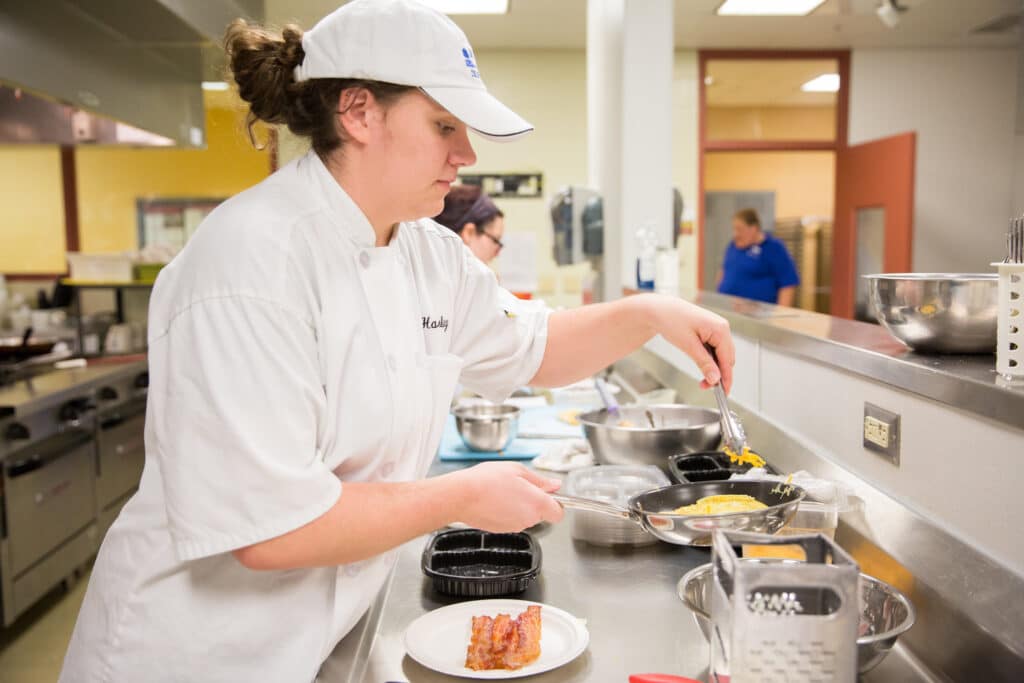Certificate│12 Credits│Fond du Lac Campus
Culinary Fundamentals Certificate
The Culinary Fundamentals certificate at MPTC sets students up to be successful in any entry-level food preparation environment.
The Culinary field provides a fast-paced environment for creative, energetic individuals to showcase their talents. In this industry, chefs and cooks get to explore new recipes, experiment with different ingredients, and present dishes in exciting ways. Working in a busy kitchen involves constant activity and teamwork, which helps people develop their cooking abilities and collaborate with others. Whether it’s preparing delicious meals, leading a kitchen team, or coming up with new menu ideas, the culinary world offers a great opportunity for passionate individuals to grow and make their mark.

What You’ll Learn
Students in the Culinary Fundamentals certificate gain hands-on, entry-level culinary skills in a professional lab, with instructors who work in the culinary field. Graduates are trained in basic cooking techniques and preparation methods, incorporating safety and sanitation guidelines while using wholesome ingredients to create nutritious meals.
The Culinary Fundamentals courses can be transferred directly into Moraine Park’s Culinary Assistant technical diploma and Culinary Arts associate degree if students wish to continue their education.
Career opportunities include, but are not limited to, the following occupations:
- Sous Chefs
- Head or Executive Chefs
- Food Service Manager
- Food and Beverage Workers
- Food Preparation Works
- Commercial Bakers
- Caterers
- Restaurant, Commercial, Institutional Cooks, Chefs
- Broiler Cooks, Vegetable Cooks, Lead Cooks, Bakers & Pastry Cooks
Earn a certificate, technical diploma and associate degree along this pathway. Start with some courses for entry-level employment, and continue with additional courses for higher wages and job advancement.
Moraine Park’s admissions starts with the online application. The admissions steps and financial aid process can take 4-5 weeks for some programs, so plan ahead.
View and begin standard admissions steps.
If you have any questions or need help with the process, please contact us at admissions@morainepark.edu OR 920-924-3200, TTY/VP:Use Relay VRS.
Estimated Costs
Estimated costs below are based on the 2023-2024 school year. These fees look at the cost to complete all classes. Costs, textbooks and supplies subject to change. For more details, see Cost of Attendance.
$2,144.40
Current tuition and fees
Coming Soon
Textbooks*
$445.30
Materials and supplies
*Based on new books, rental, electronic, and used options may be available.
Tuition Costs
The cost of your degree depends on a number of factors such as total credits required, textbooks and the financial aid you receive. Some programs have additional costs such as uniforms, technology and equipment.
Please refer to the Tuition & Fee Information for enrollment fee information.
Cost of Attendance
Cost of attendance (sometimes referred to as the “sticker price”) is the maximum amount of money it costs to attend college for one year and is used to determine your financial aid offering.
While attending Moraine Park during the 2024-25 school year, your estimated cost of attendance for one full year includes tuition of $4,462 (15 credits for fall and spring semester), fees of $338, food and housing of $3,008 (if living with parents, $9,147 if living on your own), books and supplies of $1,465, personal expenses of $3,608, and transportation of $4,017 for a total of $17,002. Your direct costs (those costs paid directly to the college) include tuition & fees. The indirect costs (costs not paid to the college) can vary from individual to individual and your own personal needs.
High school dual credit provides high school students the opportunity to earn college credit while in high school, without leaving their high school classroom. The courses are taught by certified high school instructors using technical college curriculum, grading policies and textbooks.
Has previous life experience already helped you build knowledge and skills applicable to your studies? Applying previously earned credits to a program of study can save you both time spent in the classroom and money spent on tuition and fees.
Transferring here is easy! You can transfer in prior college work by submitting official college transcripts or get a free transcript review.
Financial Aid is provided to aid eligible associate degree and technical diploma programs with 28 credits or more. Processing can take 6-8 weeks after a student’s completed Free Application for Federal Student Aid (FAFSA) is received.
Financial Aid is available for associate degree and technical diploma programs (those that are 2 semesters in length and typically with 28 credits or more). Processing can take 4-5 weeks after a student’s completed Free Application for Federal Student Aid (FAFSA) is received. Visit the Financial Aid page to learn more.
Our recruiters on any of the three campuses are ready to help you plan your future!

